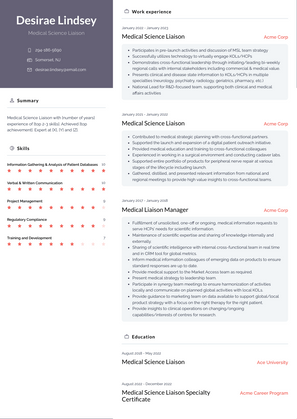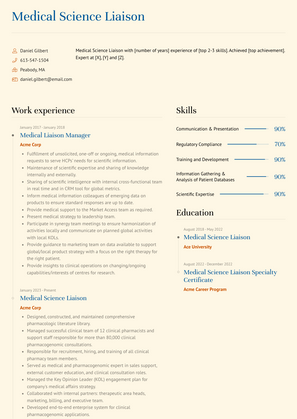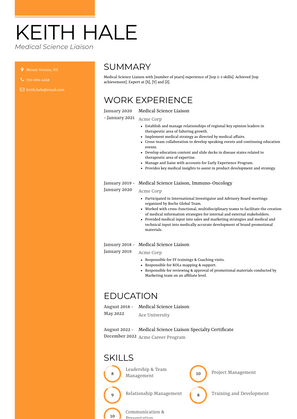3+ Medical Science Liaison Resume Examples and Templates
This page provides you with Medical Science Liaison resume samples to use to create your own resume with our easy-to-use resume builder. Below you'll find our how-to section that will guide you through each section of a Medical Science Liaison resume.



How to Write a Medical Science Liaison Resume?
To write a professional Medical Science Liaison resume, follow these steps:
- Select the right Medical Science Liaison resume template.
- Write a professional summary at the top explaining your Medical Science Liaison’s experience and achievements.
- Follow the STAR method while writing your Medical Science Liaison resume’s work experience. Show what you were responsible for and what you achieved as a Medical Science Liaison.
- List your top Medical Science Liaison skills in a separate skills section.
How to Write Your Medical Science Liaison Resume Header?
Write the perfect Medical Science Liaison resume header by:
- Adding your full name at the top of the header.
- Add a photo to your resume if you are applying for jobs outside of the US. For applying to jobs within the US, avoid adding photo to your resume header.
- Add your current Medical Science Liaison to the header to show relevance.
- Add your current city, your phone number and a professional email address.
- Finally, add a link to your portfolio to the Medical Science Liaison resume header. If there’s no portfolio link to add, consider adding a link to your LinkedIn profile instead.
Bad Medical Science Liaison Resume Example - Header Section
Arturo Miller 19 Adams Street Lorain, OH 44052 Marital Status: Married, email: cooldude2022@gmail.com
Good Medical Science Liaison Resume Example - Header Section
Arturo Miller Miller, Lorain, OH, Phone number: +1-555-555-5555, Link: linkedin/in/johndoe
Make sure to add a professional looking email address while writing your resume header. Let’s assume your name is John Doe - here is a formula you can use to create email addresses:
- firstnamelastname@email.com - johndoe@email.com
- firstname.lastname@email.com - john.doe@email.com
- lastname.firstname@email.com - doe.john@email.com
- f.lastname@email.com - j.doe@email.com
- l.firstname@email.com - d.john@email.com
- firstnamelastname12@email.com - johndoe12@email.com
For a Medical Science Liaison email, we recommend you either go with a custom domain name (john@johndoe.com) or select a very reputed email provider (Gmail or Outlook).
How to Write a Professional Medical Science Liaison Resume Summary?
Use this template to write the best Medical Science Liaison resume summary: Medical Science Liaison with [number of years] experience of [top 2-3 skills]. Achieved [top achievement]. Expert at [X], [Y] and [Z].
How to Write a Medical Science Liaison Resume Experience Section?
Here’s how you can write a job winning Medical Science Liaison resume experience section:
- Write your Medical Science Liaison work experience in a reverse chronological order.
- Use bullets instead of paragraphs to explain your Medical Science Liaison work experience.
- While describing your work experience focus on highlighting what you did and the impact you made (you can use numbers to describe your success as a Medical Science Liaison).
- Use action verbs in your bullet points.
Medical Science Liaison Resume Example
Medical Science Liaison
- Designed, constructed, and maintained comprehensive pharmacologic literature library.
- Managed successful clinical team of 12 clinical pharmacists and support staff responsible for more than 80,000 clinical pharmacogenomic consultations.
- Responsible for recruitment, hiring, and training of all clinical pharmacy team members.
- Served as medical and pharmacogenomic expert in sales support, external customer education, and clinical consultation roles.
- Managed the Key Opinion Leader (KOL) engagement plan for company's medical affairs strategy.
- Collaborated with internal partners: therapeutic area heads, marketing, billing, and executive team.
- Developed end-to-end enterprise system for clinical pharmacogenomic applications.
Medical Science Liaison Resume Example
Medical Science Liaison
- Participates in pre-launch activities and discussion of MSL team strategy
- Successfully utilizes technology to virtually engage KOLs/HCPs
- Demonstrates cross-functional leadership through initiating/leading bi-weekly regional calls with internal stakeholders including commercial & medical value.
- Presents clinical and disease state information to KOLs/HCPs in multiple specialties (neurology, psychiatry, radiology, geriatrics, pharmacy, etc.)
- National Lead for R&D-focused team, supporting both clinical and medical affairs activities
Medical Science Liaison Resume Example
Medical Science Liaison
- Contributed to medical strategic planning with cross-functional partners.
- Supported the launch and expansion of a digital patient outreach initiative.
- Provided medical education and training to cross-functional colleagues
- Experienced in working in a surgical environment and conducting cadaver labs.
- Supported entire portfolio of products for peripheral nerve repair at various stages of the lifecycle including launch.
- Gathered, distilled, and presented relevant information from national and regional meetings to provide high value insights to cross-functional teams.
Medical Science Liaison Resume Example
Medical Science Liaison
- Establish and manage relationships of regional key opinion leaders in therapeutic area of faltering growth.
- Implement medical strategy as directed by medical affairs.
- Cross-team collaboration to develop speaking events and continuing education events.
- Develop education content and slide decks in disease states related to therapeutic area of expertise.
- Manage and liaise with accounts for Early Experience Program.
- Provides key medical insights to assist in product development and strategy.
Medical Science Liaison, Immuno-Oncology Resume Example
Medical Science Liaison, Immuno-Oncology
- Participated in International Investigator and Advisory Board meetings organized by Roche Global Team.
- Worked with cross-functional, multidisciplinary teams to facilitate the creation of medical information strategies for internal and external stakeholders.
- Provided medical input into sales and marketing strategies and medical and technical input into medically accurate development of brand promotional materials.
Medical Science Liaison Resume Example
Medical Science Liaison
- Responsible for FF trainings & Coaching visits.
- Responsible for KOLs mapping & support.
- Responsible for reviewing & approval of promotional materials conducted by Marketing team on an affiliate level.
Medical Liaison Manager Resume Example
Medical Liaison Manager
- Fulfillment of unsolicited, one-off or ongoing, medical information requests to serve HCPs’ needs for scientific information.
- Maintenance of scientific expertise and sharing of knowledge internally and externally.
- Sharing of scientific intelligence with internal cross-functional team in real time and in CRM tool for global metrics.
- Inform medical information colleagues of emerging data on products to ensure standard responses are up to date.
- Provide medical support to the Market Access team as required.
- Present medical strategy to leadership team.
- Participate in synergy team meetings to ensure harmonization of activities locally and communicate on planned global activities with local KOLs.
- Provide guidance to marketing team on data available to support global/local product strategy with a focus on the right therapy for the right patient.
- Provide insights to clinical operations on changing/ongoing capabilities/interests of centres for research.
Top Medical Science Liaison Resume Skills for 2024
- Communication & Presentation
- Training and Development
- Project Management
- Scientific Expertise
- Relationship Management
- Regulatory Compliance
- Verbal & Written Communication
- Information Gathering & Analysis of Patient Databases
- Leadership & Team Management
- Practical Experience of Phase I, II, III and IV Clinical Trials
How Long Should my Medical Science Liaison Resume be?
Your Medical Science Liaison resume length should be less than one or two pages maximum. Unless you have more than 25 years of experience, any resume that’s more than two pages would appear to be too long and risk getting rejected.
On an average, for Medical Science Liaison, we see most resumes have a length of 2. And, that’s why we advise you to keep the resume length appropriate to not get rejected.
How can I highlight my experience as a Medical Science Liaison (MSL) on my resume?
To highlight your MSL experience, focus on your ability to build relationships with key opinion leaders (KOLs), provide scientific expertise, and communicate clinical data to healthcare professionals. Include examples of how you’ve supported product launches, conducted scientific presentations, and collaborated with internal teams such as medical affairs and marketing. Mention your role in answering clinical questions, educating physicians, and supporting clinical trials or research.
What are the key skills to feature on a Medical Science Liaison resume?
Key skills to feature include scientific expertise in a specific therapeutic area, relationship management, clinical data interpretation, and the ability to communicate complex information clearly. Additionally, highlight your experience in working with KOLs, conducting field visits, providing medical education, and understanding regulatory requirements. Emphasize your ability to collaborate with cross-functional teams, deliver impactful presentations, and stay current with the latest scientific developments.
How do I demonstrate my ability to communicate scientific information on my resume?
Demonstrate your ability to communicate scientific information by providing examples of how you’ve presented clinical data to healthcare professionals, supported advisory boards, or led educational sessions for internal and external stakeholders. Mention any experience you have in creating scientific content, such as slide decks or publications, and highlight your ability to translate complex clinical data into actionable insights for KOLs, physicians, and other medical experts.
Should I include metrics on my Medical Science Liaison resume? If so, what kind?
Yes, including metrics is important to quantify your impact. For example, you could mention the number of KOLs you’ve engaged with, the number of presentations or advisory boards you’ve participated in, or the number of field visits conducted. Metrics such as the successful execution of scientific presentations, increased engagement with KOLs, or contributions to product launch success provide tangible evidence of your effectiveness as an MSL.
How can I showcase my therapeutic area expertise on my resume?
You can showcase your therapeutic area expertise by detailing the specific areas of medicine or disease states in which you’ve worked, such as oncology, immunology, or cardiovascular diseases. Mention any experience you have in supporting clinical trials, conducting literature reviews, or staying up to date with the latest scientific advancements in your therapeutic area. Highlight any certifications or specialized training relevant to your field of expertise.
What kind of achievements should I highlight as a Medical Science Liaison?
Highlight achievements such as successfully launching new products, building strong relationships with KOLs, or contributing to clinical trial success through scientific support. You could also mention any recognition you’ve received for providing high-quality scientific insights, delivering impactful presentations, or enhancing medical education initiatives. Achievements that demonstrate your ability to bridge the gap between science and clinical practice are particularly valuable.
How do I address a lack of specific MSL experience on a Medical Science Liaison resume?
If you lack specific MSL experience, focus on transferable skills such as scientific knowledge, communication, and relationship-building. Mention any experience you have in working with clinical data, conducting research, or educating healthcare professionals in other roles. Highlight your ability to interpret complex scientific information, engage with stakeholders, and support medical or clinical initiatives. Emphasize your passion for the field and your desire to transition into an MSL role.
How important is experience with clinical trials for a Medical Science Liaison role?
Experience with clinical trials is highly important, as it ensures you understand the clinical development process and can provide scientific support for ongoing research. Highlight your ability to collaborate with clinical teams, assist in trial design, and communicate trial results to healthcare professionals. Mention any experience you have in working with clinical data, supporting investigator-initiated trials, or answering clinical inquiries from KOLs or investigators.
How do I demonstrate my ability to build relationships with KOLs on my resume?
Demonstrate your ability to build relationships with KOLs by describing how you’ve identified, engaged, and maintained strong professional connections with key experts in your therapeutic area. Mention any experience you have in conducting face-to-face meetings, attending medical conferences, or participating in advisory boards with KOLs. Highlight your ability to foster long-term relationships based on trust, scientific credibility, and mutual respect.
Should I include certifications on my Medical Science Liaison resume?
Yes, including certifications can enhance your resume by demonstrating your qualifications and commitment to professional development. Certifications such as Board Certified Medical Affairs Specialist (BCMAS) or Certified Medical Science Liaison (CMSL) can add significant value to your resume. Additionally, any relevant clinical or scientific certifications, such as in your therapeutic area, can further demonstrate your expertise.
-
How to Write a Professional Medical Science Liaison Resume Summary?
-
How to Write a Medical Science Liaison Resume Experience Section?
-
How can I highlight my experience as a Medical Science Liaison (MSL) on my resume?
-
What are the key skills to feature on a Medical Science Liaison resume?
-
How do I demonstrate my ability to communicate scientific information on my resume?
-
Should I include metrics on my Medical Science Liaison resume? If so, what kind?
-
How can I showcase my therapeutic area expertise on my resume?
-
What kind of achievements should I highlight as a Medical Science Liaison?
-
How do I address a lack of specific MSL experience on a Medical Science Liaison resume?
-
How important is experience with clinical trials for a Medical Science Liaison role?
-
How do I demonstrate my ability to build relationships with KOLs on my resume?
-
Should I include certifications on my Medical Science Liaison resume?
Copyright ©2025 Workstory Inc.
